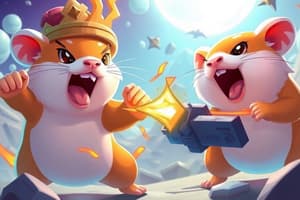Podcast
Questions and Answers
What is the main purpose of tokenomics?
What is the main purpose of tokenomics?
- To strengthen the decentralized reserve currency
- To incentivize people to buy and stake the token (correct)
- To create a reliable reserve currency
- To increase the price of the protocol
What happened to the price of the OHM protocol?
What happened to the price of the OHM protocol?
- It increased
- It stayed the same
- It decreased (correct)
- It fluctuated
What is the main focus of Hofmann’s game?
What is the main focus of Hofmann’s game?
- Money-market funds
- Decentralized autonomous organizations
- Scarcity (correct)
- Game theory
What was the name of the project whose game theory model was popularized by the meme (3,3)?
What was the name of the project whose game theory model was popularized by the meme (3,3)?
What is the purpose of cryptocurrencies?
What is the purpose of cryptocurrencies?
What is the purpose of decentralized autonomous organizations (DAOs)?
What is the purpose of decentralized autonomous organizations (DAOs)?
What caused the price of the OHM protocol to fall dramatically?
What caused the price of the OHM protocol to fall dramatically?
What is the purpose of the liquidity pool on a third-party platform?
What is the purpose of the liquidity pool on a third-party platform?
What was hyped up on Twitter in Hofmann’s game?
What was hyped up on Twitter in Hofmann’s game?
What is the main benefit of token holders voting on rules that define a cryptocurrency’s economy?
What is the main benefit of token holders voting on rules that define a cryptocurrency’s economy?
Flashcards are hidden until you start studying
Study Notes
- Cryptocurrencies are a free pass to introduce any game theory the creators would like.
- In the past few years, token holders have been able to vote on rules that define a cryptocurrency’s economy by voting using tokens through decentralized autonomous organizations, or DAOs.
- For instance, Olympus DAO operated a huge decentralized money-market fund, where those who wanted to create a reliable reserve currency benefited from additional funds joining the pool.
- According to the project’s game theory model (popularized by the meme (3,3)), the most rational choice was to stake OHM into the auto-compounding protocol.
- The tokenomics of the protocol permitted this; by staking OHM, you would strengthen the decentralized reserve currency and allow people to buy more bonds.
- On the other hand, if everyone sold OHM, that would hurt the price of the protocol, and all holders would get hit.
- So, you can see how the protocol’s tokenomics incentivized people to buy and stake the token.
- Tokenomics don’t always go to plan. Eventually, lots of people did sell OHM after investors using an OHM liquidity pool on a third-party platform were liquidated.
- That caused the price to fall dramatically, scaring other investors away from the token.
- Meanwhile, the tokenomics of Hofmann’s game revolved around scarcity; there were only 10,000-character sheets that were hyped up on Twitter, which became immensely valuable.
Studying That Suits You
Use AI to generate personalized quizzes and flashcards to suit your learning preferences.




